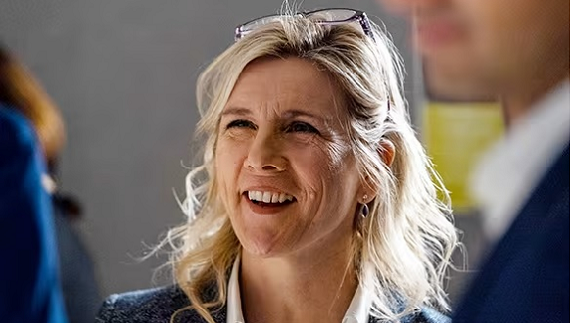
Fortnightly financial five minutes #17 Sharon Davies
Nigel Yeates, Communications and Stakeholder Business Partner, speaks to Sharon Davies, Chief Executive at Young Enterprise, about the UK skills gap and the power of financial education.
Please tell our readers about what Young Enterprise does and your role there.
Young Enterprise is a national financial and enterprise education charity. We are passionate about developing the financial capabilities and enterprising mindset of the next generation.
I’m proud to be in my 14th year working at Young Enterprise and my role as CEO over the last 3 years has meant I get to work closely with the team, teachers, and volunteers around the country to grow the charity’s impact and reach.
We believe that increased access to meaningful opportunities, combined with ongoing support, can change young people’s futures. As part of this, we strive to empower young people to build the vital skills to earn and look after their money, and make a positive contribution to their community. We provide practical employability, enterprise, and financial education programmes, working in partnership with teachers, parents, businesses, and influencers.
What is the skills gap in the UK and why is it so important?
The UK faces a serious skills gap. Almost half (49%) of young people (aged 17-23) believe their education has not prepared them for the world of work. Even more concerning is the growing number of young people who are not in education or employment - which is up 13% on the previous year.
These gaps also exist amongst the overall population and more needs to be done to reduce or remove this skills gap. An important step forward is to ensure financial literacy is an integral part of early education and development.
A recent survey of 2,000 UK adults showed that almost half are unable to pass a basic financial knowledge test around key areas including savings, investments, and retirement. Additionally, the Money and Pensions Service revealed that 55% of people don’t feel comfortable discussing their financial situation, with 67% of young people not feeling confident planning their financial future.
The skills gap in the UK is most prevalent in people from lower socio-economic backgrounds. A recent study found that poorer children were “years behind” their peers at managing money. This study also showed that the skillsets of 15-year-olds from socio-economically disadvantaged backgrounds were similar to those of 11-year-olds from more advantaged backgrounds. There’s clearly more work we need to do to ensure all children have equal access to opportunities and support. That would enable them to develop these skills to the same high standards as their more advantaged peers.
At Young Enterprise, we passionately believe in the power of financial education and its potential to increase social mobility and transform young people’s futures.
You do a lot of work in financial education, why is this so crucial?
Young people are growing up in a complex and ever-shifting financial landscape. This means that financial capability is becoming increasingly important. The right financial education can prepare the next generation of employees for unexpected socioeconomic challenges.
The last few years have seen major changes. Society has become increasingly cashless. Meanwhile, there has been a surge in scams and the use of social media to lure people into them. The cost of living crisis is also having a huge impact on people.
Through financial education, young people can be taught different ways of budgeting, saving money, and how to analyse and assess the successes of their saving habits. They can also gain insight into best practice for borrowing and learn how to leverage personal debt.
Young Enterprise works with government, MPs, civil servants, and wider industry. What are some of the most interesting initiatives you’re involved in currently and where could further strides be made?
This year we’re celebrating our 60th anniversary, so it’s a great time to look back at our achievements and the impact we’ve had. It’s also a moment to plan ahead for the future.
Recently, as the secretariat for the All Party Parliamentary Group on Financial Education for Young People, we supported an inquiry that explored barriers to delivering financial education as identified by teachers themselves. The report made a number of recommendations in how to support teachers so they can deliver a highly effective financial education.
Other initiatives include the trade fairs we’ve been hosting across the country, showcasing products developed by young entrepreneurs. Our most recent one was hosted in Spitalfields Market in London. The public were able to purchase the products that had been developed and marketed by over 40 Young Enterprise Companies.
Now, on a more personal note, if £10,000 landed in your lap tomorrow, what would you do with it?
£10,000 could go a long way to increasing young people’s access to real world, practical enterprise, and financial education activities across a range of communities that as it stands don’t get access to those opportunities. We have waiting lists of schools wanting to access our programmes, once funding becomes available, so that’s how I’d use the £10,000.
Thanks very much Sharon for those thoughts and please do keep developing the financial capabilities of the next generation.
For more information on what FSCS protects, see our What we cover page.
The content of any discussions shouldn't be taken as an indication of future FSCS policy positions. The views expressed by guests are their own and don't reflect the views of FSCS.
We would also love everyone to dedicate a regular extra five minutes to check their financial products and services are FSCS protected.